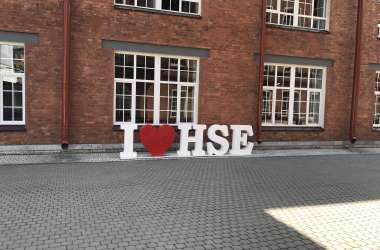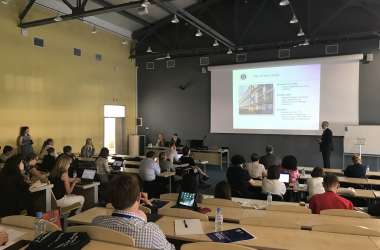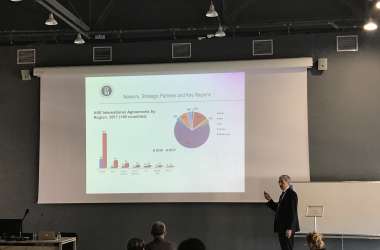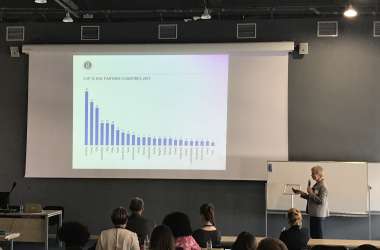Wittenborg Online News!
Strengthening ties with international partner in Russia

WUAS strengthening ties with its international partners in Russia and worldwide.
This week WUAS attended the Higher School of Economics International Partners Week, held at its St Petersburg campus to celebrate 20 years of that HSE location. Wittenborg was represented by its Chair, Peter Birdsall. The partnership week sees a range of HSE partner institutes from around the world coming together to discuss internationalisation and further strengthen their partnership ties with HSE, and often with each other. The IPW was themed "Universities: How to Be a Step Ahead", in order to highlight the importance of international academic collaboration and share best practices in addressing the challenges of the ongoing "academic revolution" : massification, commercialization, digitalization and globalization of HE and also gave an opportunity for institutes to forge new ties with each other.
‘The development of China as a study destination for international students, and as transnational education facilitator, was confirmed today, by Dr Khomyakov in a speech given to the participants at the HSE University St Petersburg International Parters Week’

In an opening seminar, Professor Maxim Khomyakov, Vice Director of HSE University, St Petersburg campus, looked at the internationalisation of Russian HE, and the trends and future strategies, also within an international context. During his explanation of worldwide trends, Dr Khomyakov highlighted that China has become central to growing international student inward mobility figures. i.e that China was now recruiting more international students than ever before to study in English on its university campuses, and that this recruitment is growing fast.
This was later in the week also confirmed by Dr Lily Dong, of the international business school at Beijing Foreign Studies University who presented their international programmes in which more than 400 international students, from over 70 different countries, study business, economics and management.

The HSE Partners Week had an interestingmix of workshops, seminars, introductions to the other HSE campuses, and an opportunity to meet HSE students interested in studying a semester abroad. Participants were also invited to take part in a number of cultural activities, and on day two, there was a wonderful presentation called ‘Understanding Russia: a practical lesson for those working with Russian HEI’. The session was presented by a group of international students, all studying at the St Petersburg campus of HSE.
During the presentation of HSE University’s internationalisation strategy, Dr. Ivan Postakov, Vice Rector International, gave an insight into the partnership programmes, the figures of student mobility and partnerships, and the strategies behind them. Marina Batalina, head of the International Cooperation Office also went into detail abut the sort of partnerships that HSE maintains and the activities they engage in. Germany and France are clearly the most popular ‘partnership’ countries for HSE, with 46 and 37 partner institutions respectively. HSE currently has agreements with 9 Dutch partners.

At the end of the week, in a session on case studies entitled ‘How to be a step ahead: practical solutions for universities’, Peter Birdsall presented a case study of Wittenborg’s move from Deventer to Apeldoorn, in 2010, the underlying motives behind the move and the aims and objectives of stakeholders from industry and from government who supported the move and continue to do so. Birdsall explained that Wittenborg’s move and support, and the links it has created through creating entrepreneurs, providing basic technology, offering companies education and technical support, providing human capital, and forging partnerships.
This he explained, was a real-life example of the establishment of a ‘triple helix’ solution in the municipality of Apeldoorn.
WUP 20/5/2018
by James Wittenborg
©WUAS Press
604 words